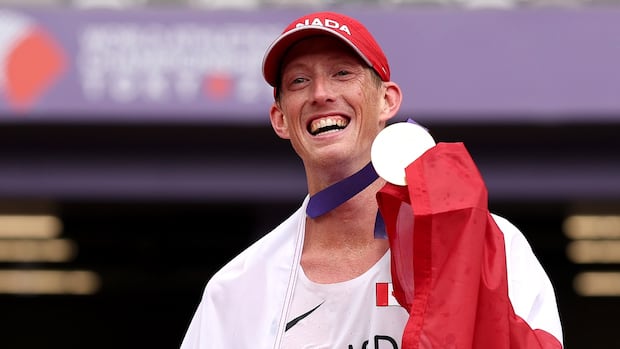In a striking denouncement that has reverberated throughout the sports community, Canadian Olympic bronze medallist Evan Dunfee has labeled the proposed Enhanced Games as “a dangerous cash grab” that threatens to undermine decades of progress in clean sport competition. The Richmond, B.C. native, who captured hearts with his medal-winning performance in the 50-kilometer race walk at the Tokyo Olympics, isn’t mincing words about what he sees as a potentially catastrophic development in athletics.
“What the Enhanced Games is proposing is to encourage drug use at levels that are not medically supervised,” Dunfee told CBC News in a recent interview. “It’s irresponsible and reckless. The potential for harm is massive.”
The Enhanced Games, backed by prominent venture capitalists including billionaire Peter Thiel, promotes itself as a competition free from drug testing, where athletes can openly use performance-enhancing substances. The controversial venture promises competitors substantial financial rewards, with organizers dangling $1 million prizes for those who break world records.
Dunfee, who has established himself as a vocal advocate for clean sport, argues that the Enhanced Games misrepresents the realities of doping. “They’re presenting this false narrative that performance-enhancing drugs are safe when used responsibly, which is just not true,” he explained. “The science doesn’t support that claim.”
The Enhanced Games organization has attempted to frame their competition as a progressive evolution in sport, suggesting that performance enhancement is inevitable and should be embraced rather than prohibited. Their promotional materials claim athletes would be medically supervised, though specific details about this oversight remain unclear.
Health experts consulted by CO24 News have expressed grave concerns about the potential ramifications. Dr. James Silvers, a sports medicine specialist at Toronto General Hospital, warned, “Without the constraints of testing, there’s a very real risk that athletes will push boundaries to dangerous levels. We could see irreversible health damage or even fatalities.”
The controversy has spread across Canadian politics as well, with several members of parliament expressing concern about the message such events send to young athletes. Minister of Sport Carla Qualtrough stated that the government remains “firmly committed to clean sport and the values of fair competition.”
For Dunfee, the threat extends beyond individual health risks to the very integrity of competitive athletics. “They’re saying they want to push human limits, but what they’re really pushing is pharmaceutical limits,” he noted. “That’s not sport—that’s a dangerous experiment.”
Critics of Dunfee’s position suggest that performance enhancement has always been part of sports evolution, from advanced nutrition to cutting-edge training techniques and equipment. Enhanced Games founder Aron D’Souza has repeatedly defended the concept, claiming it represents “the future of athletics” and arguing that current anti-doping regimes are ineffective and hypocritical.
The international sports community remains divided. While many governing bodies have condemned the Enhanced Games concept, some athletes—particularly those who have felt marginalized by existing systems—have expressed interest in the financial opportunities it presents.
Financial analysts following sports business developments suggest the controversy highlights deeper tensions in professional athletics. “What we’re seeing is a clash between traditional sporting values and market-driven innovation,” explains economics professor Mariana Chen of the University of Toronto. “There are billions of dollars at stake in how we define fair competition.”
As the debate intensifies, Dunfee remains steadfast in his opposition, pledging to continue speaking out against what he views as a dangerous precedent. “If we start normalizing doping, where does it end?” he asked. “Are we prepared to sacrifice athletes’ long-term health for short-term entertainment and profit? That’s the question we need to be asking ourselves.”










